Leadership in Global Virtual Teams: An International Management Report
VerifiedAdded on 2020/10/22
|8
|2628
|336
Report
AI Summary
This report delves into the realm of international management, specifically focusing on the leadership required to effectively manage global virtual teams, using Coca-Cola as a case study. It explores the benefits and drawbacks of such teams, emphasizing the significance of workforce diversity and its challenges, including race, ethnicity, gender, age, and religion. The report highlights the crucial role of leaders in overcoming these challenges through strong communication, training, and the development of multicultural organizations. It examines the responsibilities of leaders, including team liaison, direction setting, and operational coordination, as well as the importance of e-leadership in addressing issues and fostering trust. The report further discusses challenges such as communication conflicts, cultural diversity, and the need for appropriate technology, proposing leadership strategies like increased communication, goal setting, and feedback. Furthermore, it outlines the leadership skills required, including communication, delegation, and motivation, alongside the significance of cultural intelligence. Finally, it emphasizes the importance of training, including technology, group processes, and cross-cultural management training, to improve team performance and achieve organizational objectives.

INTERNATIONAL
MANAGEMENT
MANAGEMENT
Paraphrase This Document
Need a fresh take? Get an instant paraphrase of this document with our AI Paraphraser
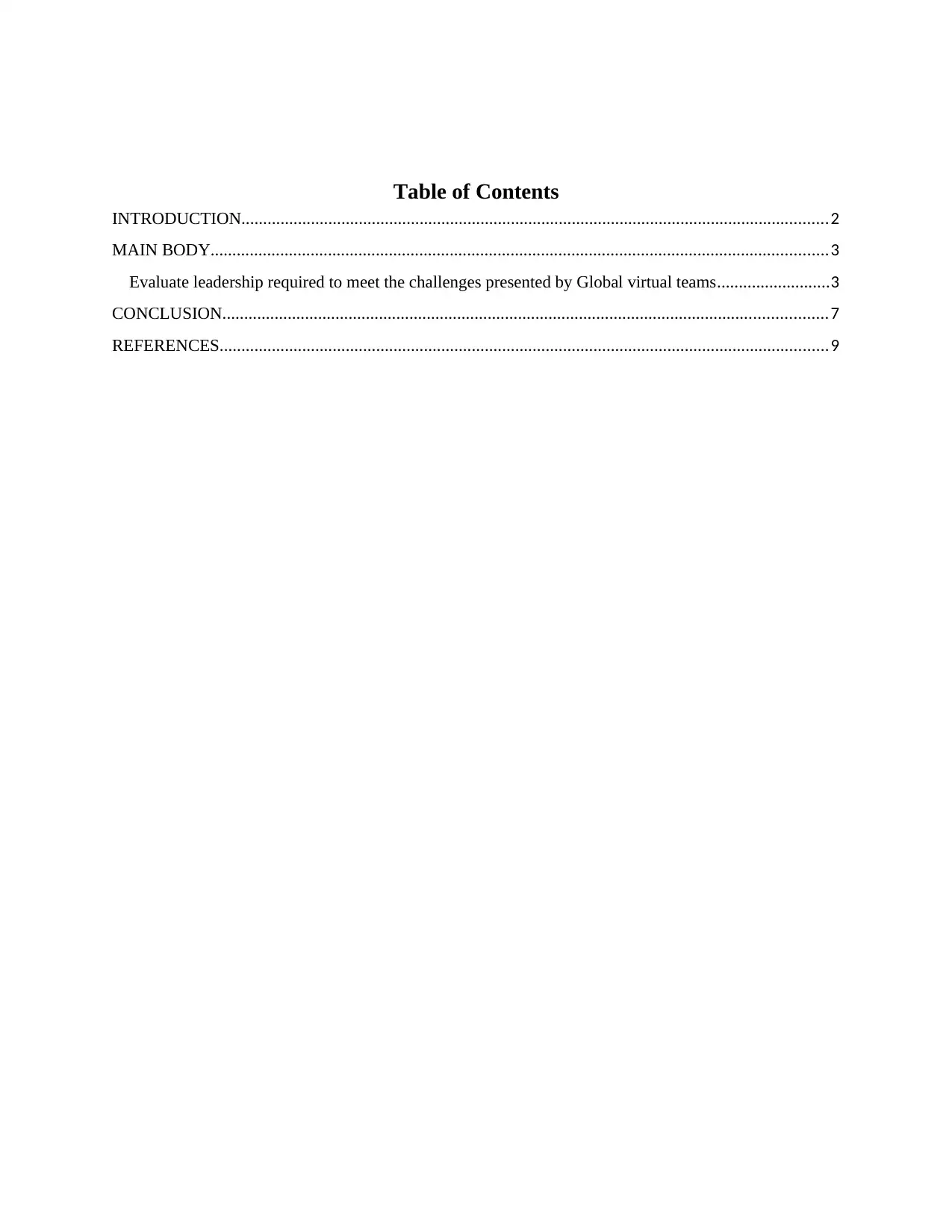
Table of Contents
INTRODUCTION.......................................................................................................................................2
MAIN BODY..............................................................................................................................................3
Evaluate leadership required to meet the challenges presented by Global virtual teams..........................3
CONCLUSION...........................................................................................................................................7
REFERENCES............................................................................................................................................9
INTRODUCTION.......................................................................................................................................2
MAIN BODY..............................................................................................................................................3
Evaluate leadership required to meet the challenges presented by Global virtual teams..........................3
CONCLUSION...........................................................................................................................................7
REFERENCES............................................................................................................................................9
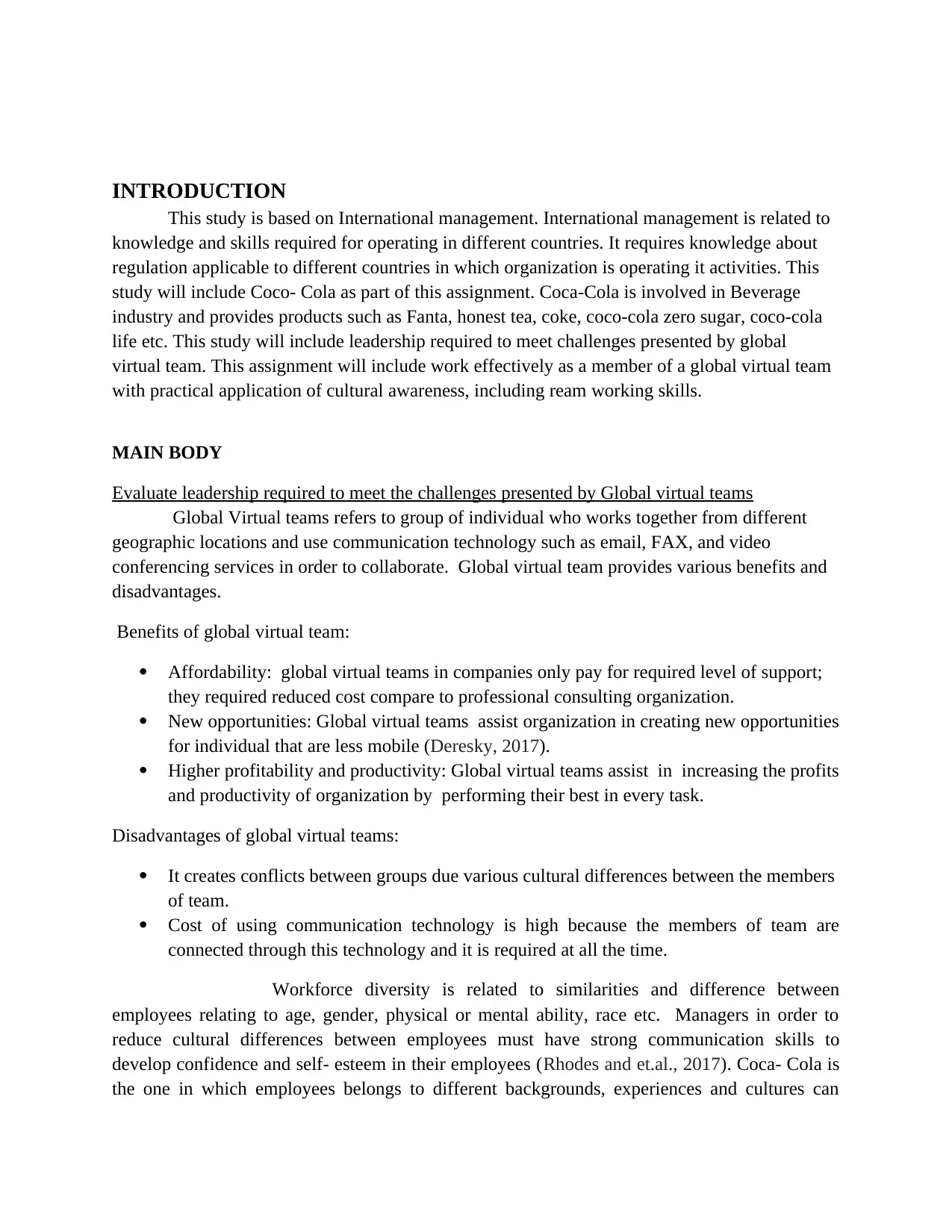
INTRODUCTION
This study is based on International management. International management is related to
knowledge and skills required for operating in different countries. It requires knowledge about
regulation applicable to different countries in which organization is operating it activities. This
study will include Coco- Cola as part of this assignment. Coca-Cola is involved in Beverage
industry and provides products such as Fanta, honest tea, coke, coco-cola zero sugar, coco-cola
life etc. This study will include leadership required to meet challenges presented by global
virtual team. This assignment will include work effectively as a member of a global virtual team
with practical application of cultural awareness, including ream working skills.
MAIN BODY
Evaluate leadership required to meet the challenges presented by Global virtual teams
Global Virtual teams refers to group of individual who works together from different
geographic locations and use communication technology such as email, FAX, and video
conferencing services in order to collaborate. Global virtual team provides various benefits and
disadvantages.
Benefits of global virtual team:
Affordability: global virtual teams in companies only pay for required level of support;
they required reduced cost compare to professional consulting organization.
New opportunities: Global virtual teams assist organization in creating new opportunities
for individual that are less mobile (Deresky, 2017).
Higher profitability and productivity: Global virtual teams assist in increasing the profits
and productivity of organization by performing their best in every task.
Disadvantages of global virtual teams:
It creates conflicts between groups due various cultural differences between the members
of team.
Cost of using communication technology is high because the members of team are
connected through this technology and it is required at all the time.
Workforce diversity is related to similarities and difference between
employees relating to age, gender, physical or mental ability, race etc. Managers in order to
reduce cultural differences between employees must have strong communication skills to
develop confidence and self- esteem in their employees (Rhodes and et.al., 2017). Coca- Cola is
the one in which employees belongs to different backgrounds, experiences and cultures can
This study is based on International management. International management is related to
knowledge and skills required for operating in different countries. It requires knowledge about
regulation applicable to different countries in which organization is operating it activities. This
study will include Coco- Cola as part of this assignment. Coca-Cola is involved in Beverage
industry and provides products such as Fanta, honest tea, coke, coco-cola zero sugar, coco-cola
life etc. This study will include leadership required to meet challenges presented by global
virtual team. This assignment will include work effectively as a member of a global virtual team
with practical application of cultural awareness, including ream working skills.
MAIN BODY
Evaluate leadership required to meet the challenges presented by Global virtual teams
Global Virtual teams refers to group of individual who works together from different
geographic locations and use communication technology such as email, FAX, and video
conferencing services in order to collaborate. Global virtual team provides various benefits and
disadvantages.
Benefits of global virtual team:
Affordability: global virtual teams in companies only pay for required level of support;
they required reduced cost compare to professional consulting organization.
New opportunities: Global virtual teams assist organization in creating new opportunities
for individual that are less mobile (Deresky, 2017).
Higher profitability and productivity: Global virtual teams assist in increasing the profits
and productivity of organization by performing their best in every task.
Disadvantages of global virtual teams:
It creates conflicts between groups due various cultural differences between the members
of team.
Cost of using communication technology is high because the members of team are
connected through this technology and it is required at all the time.
Workforce diversity is related to similarities and difference between
employees relating to age, gender, physical or mental ability, race etc. Managers in order to
reduce cultural differences between employees must have strong communication skills to
develop confidence and self- esteem in their employees (Rhodes and et.al., 2017). Coca- Cola is
the one in which employees belongs to different backgrounds, experiences and cultures can
⊘ This is a preview!⊘
Do you want full access?
Subscribe today to unlock all pages.

Trusted by 1+ million students worldwide
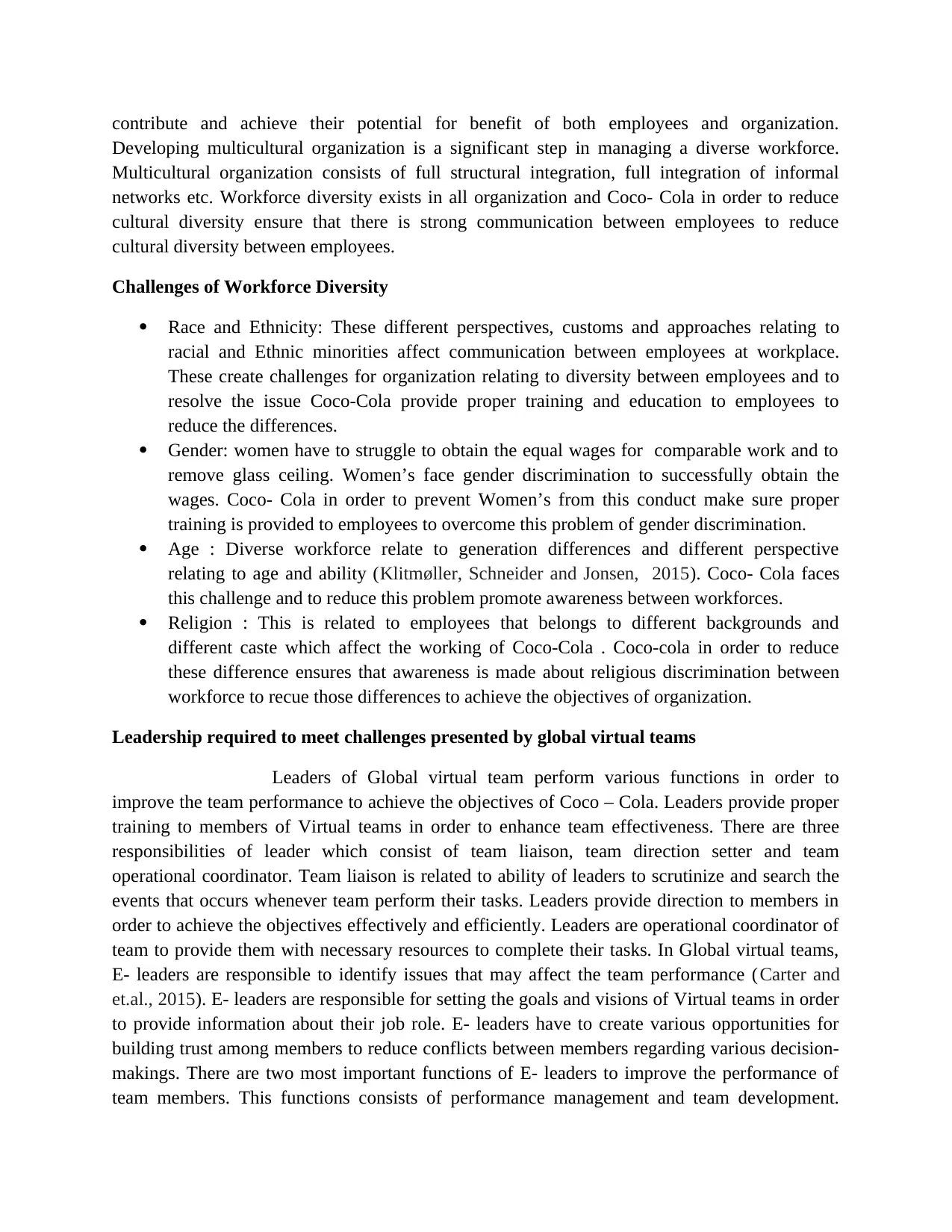
contribute and achieve their potential for benefit of both employees and organization.
Developing multicultural organization is a significant step in managing a diverse workforce.
Multicultural organization consists of full structural integration, full integration of informal
networks etc. Workforce diversity exists in all organization and Coco- Cola in order to reduce
cultural diversity ensure that there is strong communication between employees to reduce
cultural diversity between employees.
Challenges of Workforce Diversity
Race and Ethnicity: These different perspectives, customs and approaches relating to
racial and Ethnic minorities affect communication between employees at workplace.
These create challenges for organization relating to diversity between employees and to
resolve the issue Coco-Cola provide proper training and education to employees to
reduce the differences.
Gender: women have to struggle to obtain the equal wages for comparable work and to
remove glass ceiling. Women’s face gender discrimination to successfully obtain the
wages. Coco- Cola in order to prevent Women’s from this conduct make sure proper
training is provided to employees to overcome this problem of gender discrimination.
Age : Diverse workforce relate to generation differences and different perspective
relating to age and ability (Klitmøller, Schneider and Jonsen, 2015). Coco- Cola faces
this challenge and to reduce this problem promote awareness between workforces.
Religion : This is related to employees that belongs to different backgrounds and
different caste which affect the working of Coco-Cola . Coco-cola in order to reduce
these difference ensures that awareness is made about religious discrimination between
workforce to recue those differences to achieve the objectives of organization.
Leadership required to meet challenges presented by global virtual teams
Leaders of Global virtual team perform various functions in order to
improve the team performance to achieve the objectives of Coco – Cola. Leaders provide proper
training to members of Virtual teams in order to enhance team effectiveness. There are three
responsibilities of leader which consist of team liaison, team direction setter and team
operational coordinator. Team liaison is related to ability of leaders to scrutinize and search the
events that occurs whenever team perform their tasks. Leaders provide direction to members in
order to achieve the objectives effectively and efficiently. Leaders are operational coordinator of
team to provide them with necessary resources to complete their tasks. In Global virtual teams,
E- leaders are responsible to identify issues that may affect the team performance (Carter and
et.al., 2015). E- leaders are responsible for setting the goals and visions of Virtual teams in order
to provide information about their job role. E- leaders have to create various opportunities for
building trust among members to reduce conflicts between members regarding various decision-
makings. There are two most important functions of E- leaders to improve the performance of
team members. This functions consists of performance management and team development.
Developing multicultural organization is a significant step in managing a diverse workforce.
Multicultural organization consists of full structural integration, full integration of informal
networks etc. Workforce diversity exists in all organization and Coco- Cola in order to reduce
cultural diversity ensure that there is strong communication between employees to reduce
cultural diversity between employees.
Challenges of Workforce Diversity
Race and Ethnicity: These different perspectives, customs and approaches relating to
racial and Ethnic minorities affect communication between employees at workplace.
These create challenges for organization relating to diversity between employees and to
resolve the issue Coco-Cola provide proper training and education to employees to
reduce the differences.
Gender: women have to struggle to obtain the equal wages for comparable work and to
remove glass ceiling. Women’s face gender discrimination to successfully obtain the
wages. Coco- Cola in order to prevent Women’s from this conduct make sure proper
training is provided to employees to overcome this problem of gender discrimination.
Age : Diverse workforce relate to generation differences and different perspective
relating to age and ability (Klitmøller, Schneider and Jonsen, 2015). Coco- Cola faces
this challenge and to reduce this problem promote awareness between workforces.
Religion : This is related to employees that belongs to different backgrounds and
different caste which affect the working of Coco-Cola . Coco-cola in order to reduce
these difference ensures that awareness is made about religious discrimination between
workforce to recue those differences to achieve the objectives of organization.
Leadership required to meet challenges presented by global virtual teams
Leaders of Global virtual team perform various functions in order to
improve the team performance to achieve the objectives of Coco – Cola. Leaders provide proper
training to members of Virtual teams in order to enhance team effectiveness. There are three
responsibilities of leader which consist of team liaison, team direction setter and team
operational coordinator. Team liaison is related to ability of leaders to scrutinize and search the
events that occurs whenever team perform their tasks. Leaders provide direction to members in
order to achieve the objectives effectively and efficiently. Leaders are operational coordinator of
team to provide them with necessary resources to complete their tasks. In Global virtual teams,
E- leaders are responsible to identify issues that may affect the team performance (Carter and
et.al., 2015). E- leaders are responsible for setting the goals and visions of Virtual teams in order
to provide information about their job role. E- leaders have to create various opportunities for
building trust among members to reduce conflicts between members regarding various decision-
makings. There are two most important functions of E- leaders to improve the performance of
team members. This functions consists of performance management and team development.
Paraphrase This Document
Need a fresh take? Get an instant paraphrase of this document with our AI Paraphraser
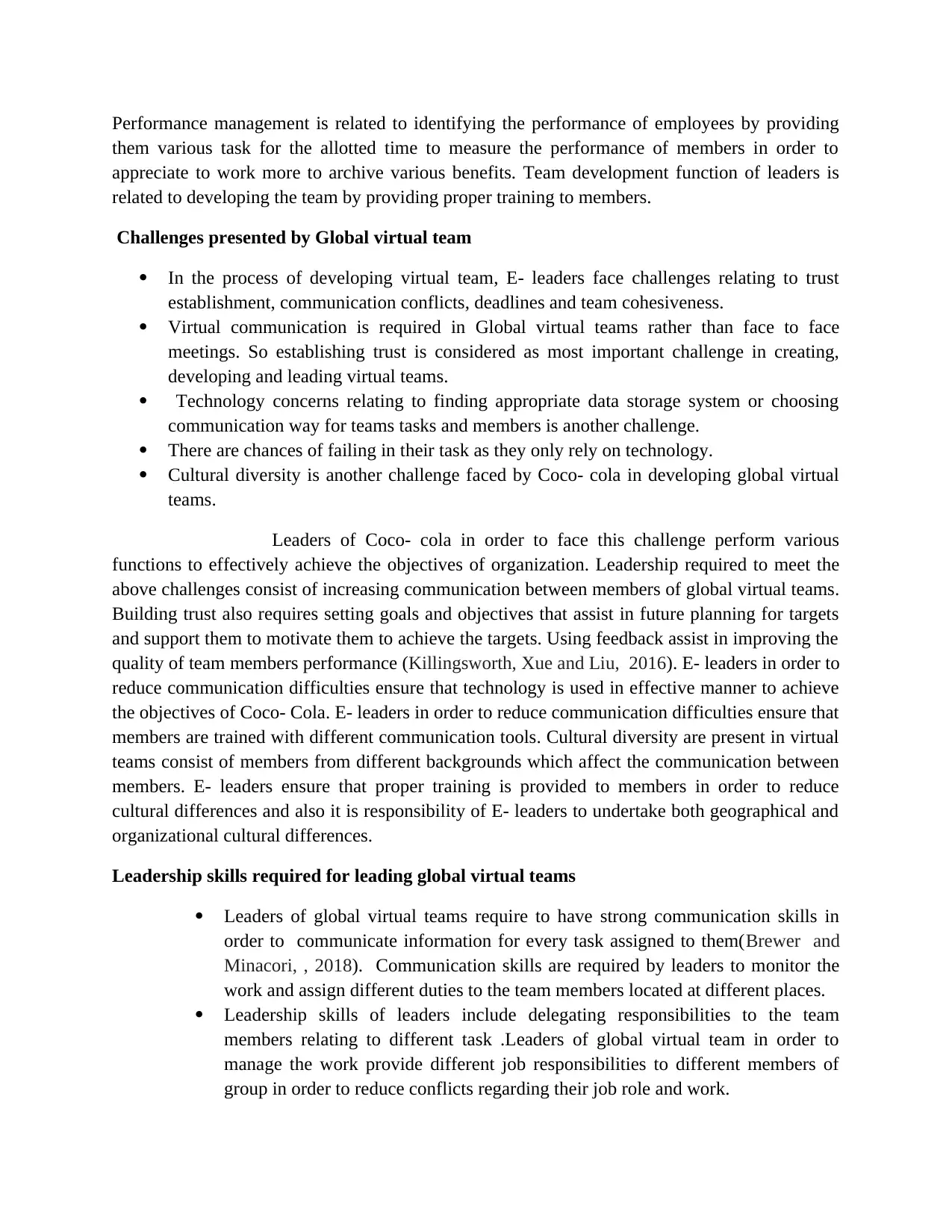
Performance management is related to identifying the performance of employees by providing
them various task for the allotted time to measure the performance of members in order to
appreciate to work more to archive various benefits. Team development function of leaders is
related to developing the team by providing proper training to members.
Challenges presented by Global virtual team
In the process of developing virtual team, E- leaders face challenges relating to trust
establishment, communication conflicts, deadlines and team cohesiveness.
Virtual communication is required in Global virtual teams rather than face to face
meetings. So establishing trust is considered as most important challenge in creating,
developing and leading virtual teams.
Technology concerns relating to finding appropriate data storage system or choosing
communication way for teams tasks and members is another challenge.
There are chances of failing in their task as they only rely on technology.
Cultural diversity is another challenge faced by Coco- cola in developing global virtual
teams.
Leaders of Coco- cola in order to face this challenge perform various
functions to effectively achieve the objectives of organization. Leadership required to meet the
above challenges consist of increasing communication between members of global virtual teams.
Building trust also requires setting goals and objectives that assist in future planning for targets
and support them to motivate them to achieve the targets. Using feedback assist in improving the
quality of team members performance (Killingsworth, Xue and Liu, 2016). E- leaders in order to
reduce communication difficulties ensure that technology is used in effective manner to achieve
the objectives of Coco- Cola. E- leaders in order to reduce communication difficulties ensure that
members are trained with different communication tools. Cultural diversity are present in virtual
teams consist of members from different backgrounds which affect the communication between
members. E- leaders ensure that proper training is provided to members in order to reduce
cultural differences and also it is responsibility of E- leaders to undertake both geographical and
organizational cultural differences.
Leadership skills required for leading global virtual teams
Leaders of global virtual teams require to have strong communication skills in
order to communicate information for every task assigned to them(Brewer and
Minacori, , 2018). Communication skills are required by leaders to monitor the
work and assign different duties to the team members located at different places.
Leadership skills of leaders include delegating responsibilities to the team
members relating to different task .Leaders of global virtual team in order to
manage the work provide different job responsibilities to different members of
group in order to reduce conflicts regarding their job role and work.
them various task for the allotted time to measure the performance of members in order to
appreciate to work more to archive various benefits. Team development function of leaders is
related to developing the team by providing proper training to members.
Challenges presented by Global virtual team
In the process of developing virtual team, E- leaders face challenges relating to trust
establishment, communication conflicts, deadlines and team cohesiveness.
Virtual communication is required in Global virtual teams rather than face to face
meetings. So establishing trust is considered as most important challenge in creating,
developing and leading virtual teams.
Technology concerns relating to finding appropriate data storage system or choosing
communication way for teams tasks and members is another challenge.
There are chances of failing in their task as they only rely on technology.
Cultural diversity is another challenge faced by Coco- cola in developing global virtual
teams.
Leaders of Coco- cola in order to face this challenge perform various
functions to effectively achieve the objectives of organization. Leadership required to meet the
above challenges consist of increasing communication between members of global virtual teams.
Building trust also requires setting goals and objectives that assist in future planning for targets
and support them to motivate them to achieve the targets. Using feedback assist in improving the
quality of team members performance (Killingsworth, Xue and Liu, 2016). E- leaders in order to
reduce communication difficulties ensure that technology is used in effective manner to achieve
the objectives of Coco- Cola. E- leaders in order to reduce communication difficulties ensure that
members are trained with different communication tools. Cultural diversity are present in virtual
teams consist of members from different backgrounds which affect the communication between
members. E- leaders ensure that proper training is provided to members in order to reduce
cultural differences and also it is responsibility of E- leaders to undertake both geographical and
organizational cultural differences.
Leadership skills required for leading global virtual teams
Leaders of global virtual teams require to have strong communication skills in
order to communicate information for every task assigned to them(Brewer and
Minacori, , 2018). Communication skills are required by leaders to monitor the
work and assign different duties to the team members located at different places.
Leadership skills of leaders include delegating responsibilities to the team
members relating to different task .Leaders of global virtual team in order to
manage the work provide different job responsibilities to different members of
group in order to reduce conflicts regarding their job role and work.
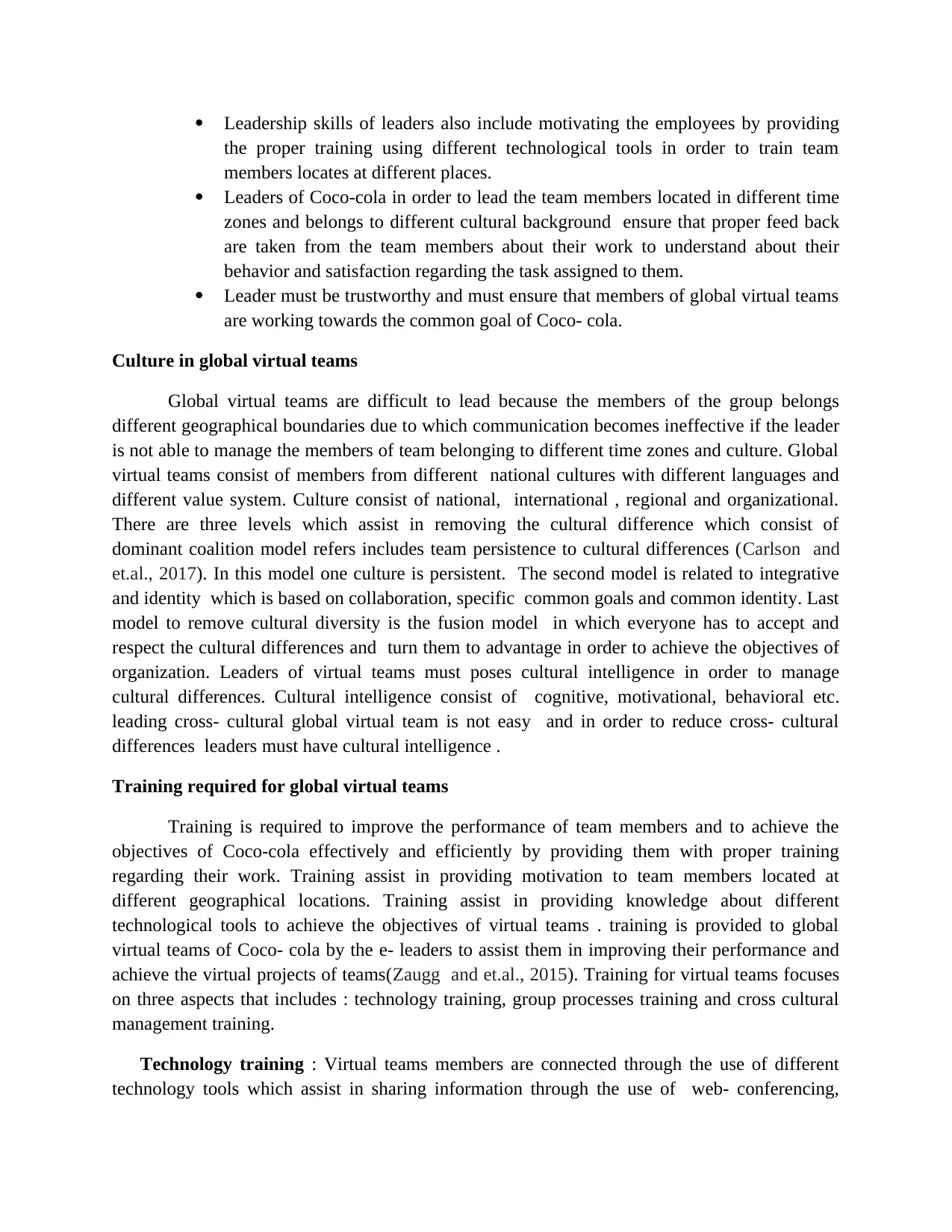
Leadership skills of leaders also include motivating the employees by providing
the proper training using different technological tools in order to train team
members locates at different places.
Leaders of Coco-cola in order to lead the team members located in different time
zones and belongs to different cultural background ensure that proper feed back
are taken from the team members about their work to understand about their
behavior and satisfaction regarding the task assigned to them.
Leader must be trustworthy and must ensure that members of global virtual teams
are working towards the common goal of Coco- cola.
Culture in global virtual teams
Global virtual teams are difficult to lead because the members of the group belongs
different geographical boundaries due to which communication becomes ineffective if the leader
is not able to manage the members of team belonging to different time zones and culture. Global
virtual teams consist of members from different national cultures with different languages and
different value system. Culture consist of national, international , regional and organizational.
There are three levels which assist in removing the cultural difference which consist of
dominant coalition model refers includes team persistence to cultural differences (Carlson and
et.al., 2017). In this model one culture is persistent. The second model is related to integrative
and identity which is based on collaboration, specific common goals and common identity. Last
model to remove cultural diversity is the fusion model in which everyone has to accept and
respect the cultural differences and turn them to advantage in order to achieve the objectives of
organization. Leaders of virtual teams must poses cultural intelligence in order to manage
cultural differences. Cultural intelligence consist of cognitive, motivational, behavioral etc.
leading cross- cultural global virtual team is not easy and in order to reduce cross- cultural
differences leaders must have cultural intelligence .
Training required for global virtual teams
Training is required to improve the performance of team members and to achieve the
objectives of Coco-cola effectively and efficiently by providing them with proper training
regarding their work. Training assist in providing motivation to team members located at
different geographical locations. Training assist in providing knowledge about different
technological tools to achieve the objectives of virtual teams . training is provided to global
virtual teams of Coco- cola by the e- leaders to assist them in improving their performance and
achieve the virtual projects of teams(Zaugg and et.al., 2015). Training for virtual teams focuses
on three aspects that includes : technology training, group processes training and cross cultural
management training.
Technology training : Virtual teams members are connected through the use of different
technology tools which assist in sharing information through the use of web- conferencing,
the proper training using different technological tools in order to train team
members locates at different places.
Leaders of Coco-cola in order to lead the team members located in different time
zones and belongs to different cultural background ensure that proper feed back
are taken from the team members about their work to understand about their
behavior and satisfaction regarding the task assigned to them.
Leader must be trustworthy and must ensure that members of global virtual teams
are working towards the common goal of Coco- cola.
Culture in global virtual teams
Global virtual teams are difficult to lead because the members of the group belongs
different geographical boundaries due to which communication becomes ineffective if the leader
is not able to manage the members of team belonging to different time zones and culture. Global
virtual teams consist of members from different national cultures with different languages and
different value system. Culture consist of national, international , regional and organizational.
There are three levels which assist in removing the cultural difference which consist of
dominant coalition model refers includes team persistence to cultural differences (Carlson and
et.al., 2017). In this model one culture is persistent. The second model is related to integrative
and identity which is based on collaboration, specific common goals and common identity. Last
model to remove cultural diversity is the fusion model in which everyone has to accept and
respect the cultural differences and turn them to advantage in order to achieve the objectives of
organization. Leaders of virtual teams must poses cultural intelligence in order to manage
cultural differences. Cultural intelligence consist of cognitive, motivational, behavioral etc.
leading cross- cultural global virtual team is not easy and in order to reduce cross- cultural
differences leaders must have cultural intelligence .
Training required for global virtual teams
Training is required to improve the performance of team members and to achieve the
objectives of Coco-cola effectively and efficiently by providing them with proper training
regarding their work. Training assist in providing motivation to team members located at
different geographical locations. Training assist in providing knowledge about different
technological tools to achieve the objectives of virtual teams . training is provided to global
virtual teams of Coco- cola by the e- leaders to assist them in improving their performance and
achieve the virtual projects of teams(Zaugg and et.al., 2015). Training for virtual teams focuses
on three aspects that includes : technology training, group processes training and cross cultural
management training.
Technology training : Virtual teams members are connected through the use of different
technology tools which assist in sharing information through the use of web- conferencing,
⊘ This is a preview!⊘
Do you want full access?
Subscribe today to unlock all pages.

Trusted by 1+ million students worldwide
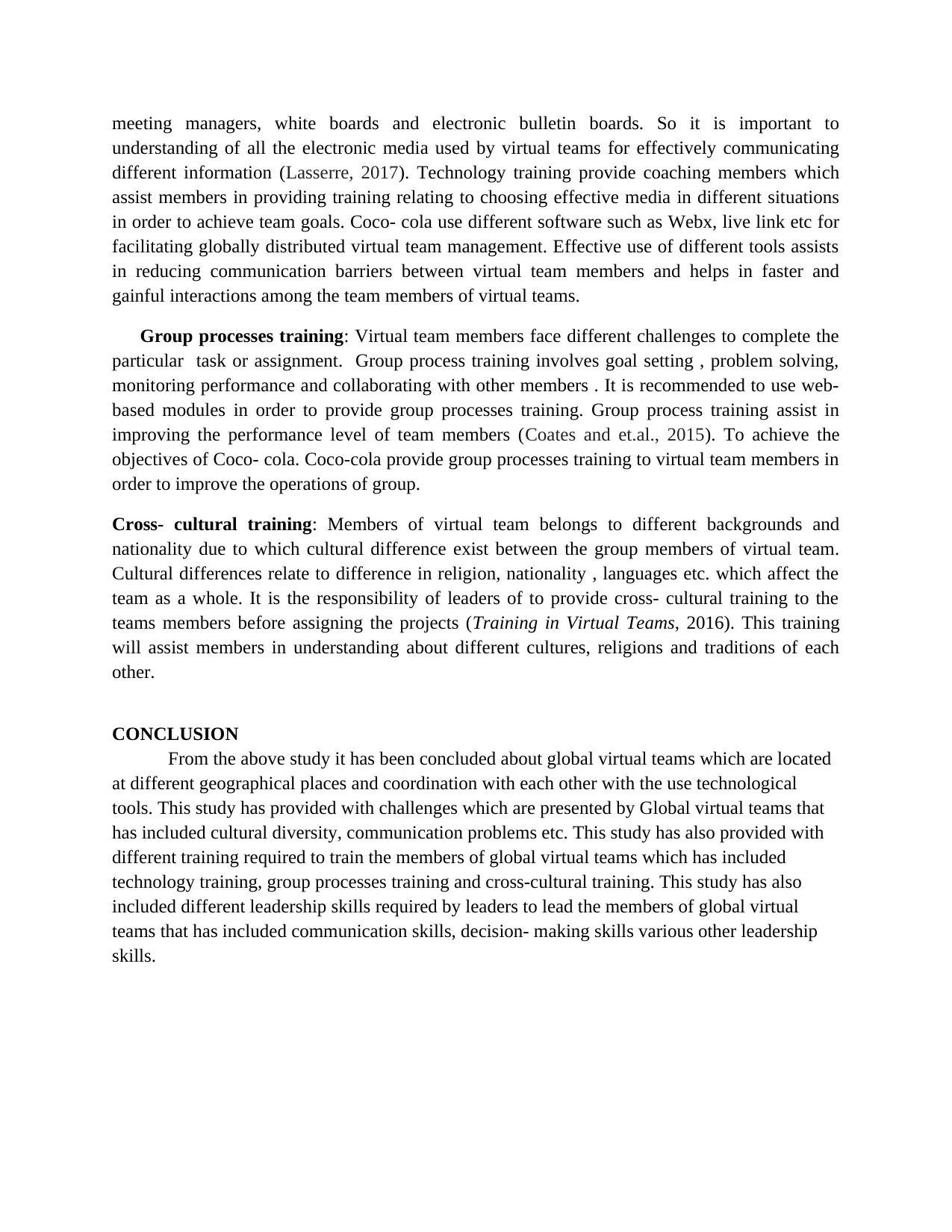
meeting managers, white boards and electronic bulletin boards. So it is important to
understanding of all the electronic media used by virtual teams for effectively communicating
different information (Lasserre, 2017). Technology training provide coaching members which
assist members in providing training relating to choosing effective media in different situations
in order to achieve team goals. Coco- cola use different software such as Webx, live link etc for
facilitating globally distributed virtual team management. Effective use of different tools assists
in reducing communication barriers between virtual team members and helps in faster and
gainful interactions among the team members of virtual teams.
Group processes training: Virtual team members face different challenges to complete the
particular task or assignment. Group process training involves goal setting , problem solving,
monitoring performance and collaborating with other members . It is recommended to use web-
based modules in order to provide group processes training. Group process training assist in
improving the performance level of team members (Coates and et.al., 2015). To achieve the
objectives of Coco- cola. Coco-cola provide group processes training to virtual team members in
order to improve the operations of group.
Cross- cultural training: Members of virtual team belongs to different backgrounds and
nationality due to which cultural difference exist between the group members of virtual team.
Cultural differences relate to difference in religion, nationality , languages etc. which affect the
team as a whole. It is the responsibility of leaders of to provide cross- cultural training to the
teams members before assigning the projects (Training in Virtual Teams, 2016). This training
will assist members in understanding about different cultures, religions and traditions of each
other.
CONCLUSION
From the above study it has been concluded about global virtual teams which are located
at different geographical places and coordination with each other with the use technological
tools. This study has provided with challenges which are presented by Global virtual teams that
has included cultural diversity, communication problems etc. This study has also provided with
different training required to train the members of global virtual teams which has included
technology training, group processes training and cross-cultural training. This study has also
included different leadership skills required by leaders to lead the members of global virtual
teams that has included communication skills, decision- making skills various other leadership
skills.
understanding of all the electronic media used by virtual teams for effectively communicating
different information (Lasserre, 2017). Technology training provide coaching members which
assist members in providing training relating to choosing effective media in different situations
in order to achieve team goals. Coco- cola use different software such as Webx, live link etc for
facilitating globally distributed virtual team management. Effective use of different tools assists
in reducing communication barriers between virtual team members and helps in faster and
gainful interactions among the team members of virtual teams.
Group processes training: Virtual team members face different challenges to complete the
particular task or assignment. Group process training involves goal setting , problem solving,
monitoring performance and collaborating with other members . It is recommended to use web-
based modules in order to provide group processes training. Group process training assist in
improving the performance level of team members (Coates and et.al., 2015). To achieve the
objectives of Coco- cola. Coco-cola provide group processes training to virtual team members in
order to improve the operations of group.
Cross- cultural training: Members of virtual team belongs to different backgrounds and
nationality due to which cultural difference exist between the group members of virtual team.
Cultural differences relate to difference in religion, nationality , languages etc. which affect the
team as a whole. It is the responsibility of leaders of to provide cross- cultural training to the
teams members before assigning the projects (Training in Virtual Teams, 2016). This training
will assist members in understanding about different cultures, religions and traditions of each
other.
CONCLUSION
From the above study it has been concluded about global virtual teams which are located
at different geographical places and coordination with each other with the use technological
tools. This study has provided with challenges which are presented by Global virtual teams that
has included cultural diversity, communication problems etc. This study has also provided with
different training required to train the members of global virtual teams which has included
technology training, group processes training and cross-cultural training. This study has also
included different leadership skills required by leaders to lead the members of global virtual
teams that has included communication skills, decision- making skills various other leadership
skills.
Paraphrase This Document
Need a fresh take? Get an instant paraphrase of this document with our AI Paraphraser
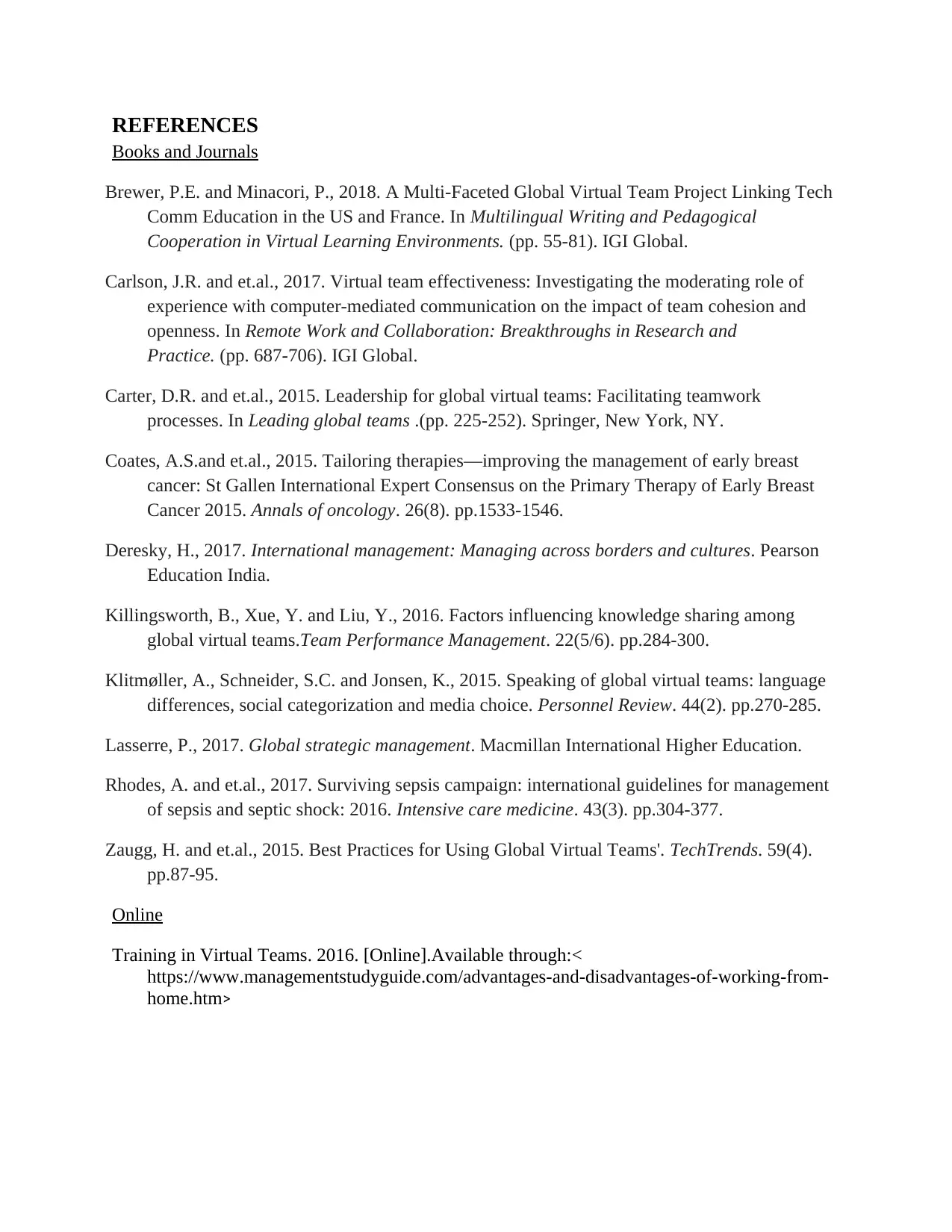
REFERENCES
Books and Journals
Brewer, P.E. and Minacori, P., 2018. A Multi-Faceted Global Virtual Team Project Linking Tech
Comm Education in the US and France. In Multilingual Writing and Pedagogical
Cooperation in Virtual Learning Environments. (pp. 55-81). IGI Global.
Carlson, J.R. and et.al., 2017. Virtual team effectiveness: Investigating the moderating role of
experience with computer-mediated communication on the impact of team cohesion and
openness. In Remote Work and Collaboration: Breakthroughs in Research and
Practice. (pp. 687-706). IGI Global.
Carter, D.R. and et.al., 2015. Leadership for global virtual teams: Facilitating teamwork
processes. In Leading global teams .(pp. 225-252). Springer, New York, NY.
Coates, A.S.and et.al., 2015. Tailoring therapies—improving the management of early breast
cancer: St Gallen International Expert Consensus on the Primary Therapy of Early Breast
Cancer 2015. Annals of oncology. 26(8). pp.1533-1546.
Deresky, H., 2017. International management: Managing across borders and cultures. Pearson
Education India.
Killingsworth, B., Xue, Y. and Liu, Y., 2016. Factors influencing knowledge sharing among
global virtual teams.Team Performance Management. 22(5/6). pp.284-300.
Klitmøller, A., Schneider, S.C. and Jonsen, K., 2015. Speaking of global virtual teams: language
differences, social categorization and media choice. Personnel Review. 44(2). pp.270-285.
Lasserre, P., 2017. Global strategic management. Macmillan International Higher Education.
Rhodes, A. and et.al., 2017. Surviving sepsis campaign: international guidelines for management
of sepsis and septic shock: 2016. Intensive care medicine. 43(3). pp.304-377.
Zaugg, H. and et.al., 2015. Best Practices for Using Global Virtual Teams'. TechTrends. 59(4).
pp.87-95.
Online
Training in Virtual Teams. 2016. [Online].Available through:<
https://www.managementstudyguide.com/advantages-and-disadvantages-of-working-from-
home.htm>
Books and Journals
Brewer, P.E. and Minacori, P., 2018. A Multi-Faceted Global Virtual Team Project Linking Tech
Comm Education in the US and France. In Multilingual Writing and Pedagogical
Cooperation in Virtual Learning Environments. (pp. 55-81). IGI Global.
Carlson, J.R. and et.al., 2017. Virtual team effectiveness: Investigating the moderating role of
experience with computer-mediated communication on the impact of team cohesion and
openness. In Remote Work and Collaboration: Breakthroughs in Research and
Practice. (pp. 687-706). IGI Global.
Carter, D.R. and et.al., 2015. Leadership for global virtual teams: Facilitating teamwork
processes. In Leading global teams .(pp. 225-252). Springer, New York, NY.
Coates, A.S.and et.al., 2015. Tailoring therapies—improving the management of early breast
cancer: St Gallen International Expert Consensus on the Primary Therapy of Early Breast
Cancer 2015. Annals of oncology. 26(8). pp.1533-1546.
Deresky, H., 2017. International management: Managing across borders and cultures. Pearson
Education India.
Killingsworth, B., Xue, Y. and Liu, Y., 2016. Factors influencing knowledge sharing among
global virtual teams.Team Performance Management. 22(5/6). pp.284-300.
Klitmøller, A., Schneider, S.C. and Jonsen, K., 2015. Speaking of global virtual teams: language
differences, social categorization and media choice. Personnel Review. 44(2). pp.270-285.
Lasserre, P., 2017. Global strategic management. Macmillan International Higher Education.
Rhodes, A. and et.al., 2017. Surviving sepsis campaign: international guidelines for management
of sepsis and septic shock: 2016. Intensive care medicine. 43(3). pp.304-377.
Zaugg, H. and et.al., 2015. Best Practices for Using Global Virtual Teams'. TechTrends. 59(4).
pp.87-95.
Online
Training in Virtual Teams. 2016. [Online].Available through:<
https://www.managementstudyguide.com/advantages-and-disadvantages-of-working-from-
home.htm>
1 out of 8
Related Documents
Your All-in-One AI-Powered Toolkit for Academic Success.
+13062052269
info@desklib.com
Available 24*7 on WhatsApp / Email
![[object Object]](/_next/static/media/star-bottom.7253800d.svg)
Unlock your academic potential
Copyright © 2020–2026 A2Z Services. All Rights Reserved. Developed and managed by ZUCOL.





